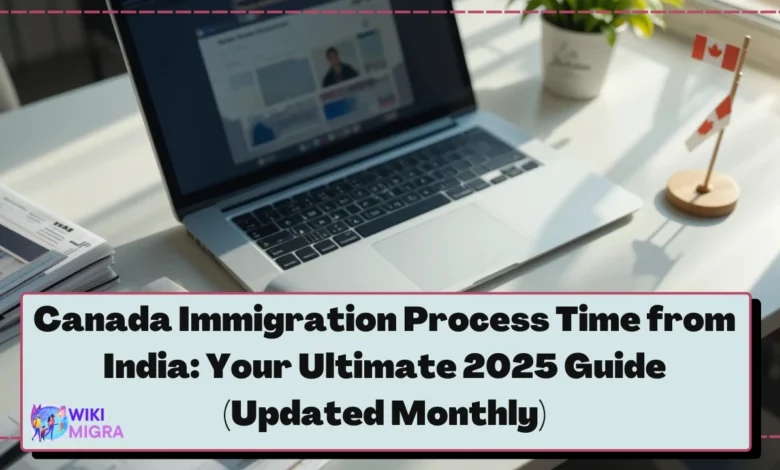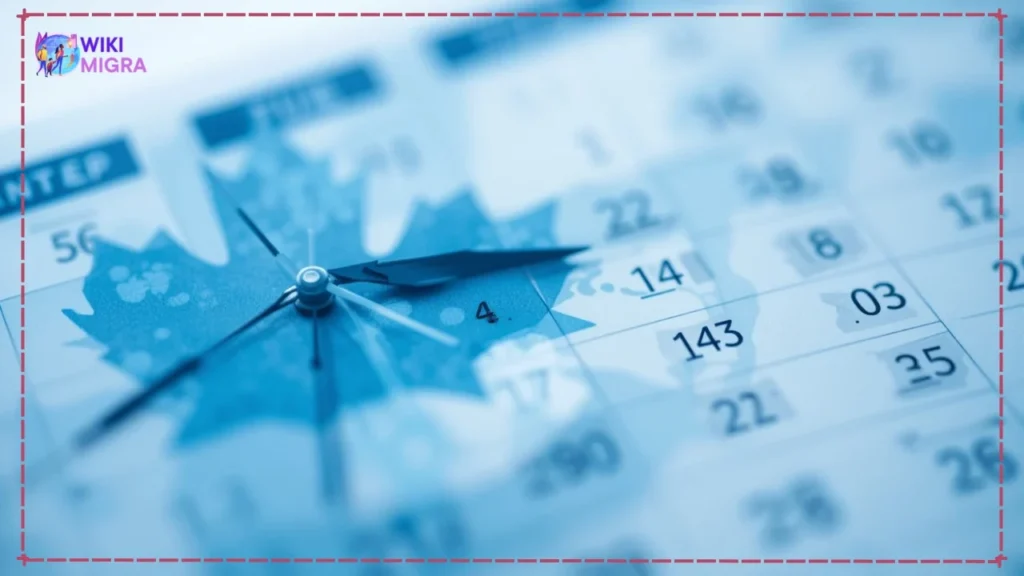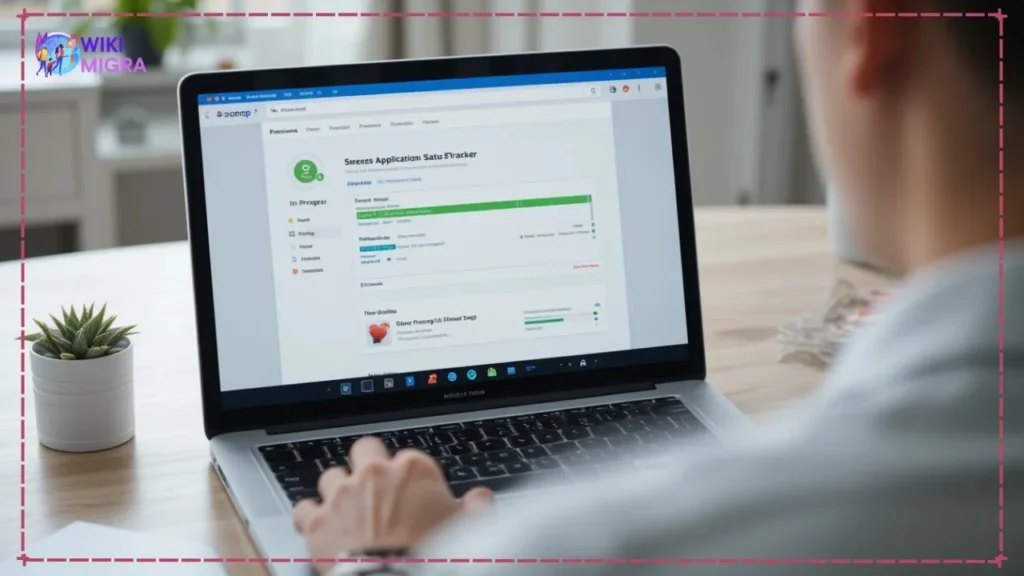Canada Immigration Process Time from India: Your Ultimate 2025 Guide (Updated Monthly)

Planning your move or visit to Canada from India? Congratulations! You’re embarking on an exciting journey. But amidst the excitement, one question inevitably looms large: “How long will it take?” Understanding the Canada immigration process time from India is crucial for planning your finances, career moves, family arrangements, and managing your own expectations.
The truth is, processing times can feel like a complex puzzle. They vary significantly based on the type of visa you’re applying for, the completeness of your application, current IRCC (Immigration, Refugees and Citizenship Canada) workloads, and several other factors. It’s not a single number, but a range influenced by many moving parts.
We get it. Waiting can be stressful. That’s why we’ve created this ultimate guide specifically for applicants from India. Our goal at Immigration Gateway is to demystify the timelines, provide clarity, and equip you with the knowledge you need.
Quick Look: Estimated Average Canada Visa Processing Time India
| Visa/Application Type | Estimated Average Processing Time (from India) | Notes |
| Visitor Visa (TRV) | 4 – 10 Weeks | Can vary significantly based on individual circumstances & workload. |
| Super Visa (Parents/GP) | 6 – 12 Weeks | Requires medical exam; depends on specific visa office workload. |
| Study Permit (SDS Stream) | 20 – 30 Calendar Days | Student Direct Stream offers expedited processing for eligible Indians. |
| Study Permit (Non-SDS) | 6 – 12 Weeks | Standard processing; requires more extensive documentation review. |
| Work Permit (LMIA-Based) | 8 – 16 Weeks | Includes LMIA processing time (if applicable) + work permit application. |
| Work Permit (LMIA-Exempt) | 6 – 12 Weeks | Examples include Intra-Company Transfers, PGWP extensions. |
| Express Entry (Post-ITA) | Within 6 Months (Target) | IRCC aims for this standard for 80% of FSWP, CEC, FSTP applications. |
| PNP (Provincial Nomination) | 3 – 9 Months (Varies by Province) | This is just for the provincial nomination certificate stage. |
| PNP (Federal PR Stage) | 12 – 18 Months | After receiving provincial nomination, federal processing begins. |
| **Spousal Sponsorship (Outland) | 12 – 24 Months | Processed via relevant visa office (often New Delhi for India). |
Disclaimer: These are estimates based on current IRCC data and trends for applications submitted from India as of October 2024. Processing times are subject to change without notice. Always check the official IRCC tool for the most up-to-date information.
Now, let’s dive deeper into understanding these timelines and what influences them.
Understanding IRCC Processing Times: How Does Canada Calculate Them?

When you look up IRCC processing times India or use the official tool, what do those numbers actually mean? It’s not always straightforward. Here’s the breakdown:
- The 80% Rule: IRCC typically calculates processing times based on how long it took to process 80% of past applications finalized within the last few months or year. This means 20% of applications took longer (and some might have been faster). It’s an average reflecting recent performance, not a guaranteed deadline for your specific application.
- Start and End Points: Processing time usually starts the day IRCC receives your complete application and ends when a final decision is made. It does not typically include the time it takes for you to:
- Mail your application (if paper-based).
- Give your biometrics at a Visa Application Centre (VAC).
- Receive your documents back after a decision.
- Official IRCC Processing Times Tool: Your single source of truth should always be the official Government of Canada tool. Bookmark this link:
- Check processing times – Canada.ca
This tool allows you to select the specific application type and, often, the country of submission (India) to get the most relevant estimate.
- Check processing times – Canada.ca
- Visa Application Centre (VAC) vs. IRCC Processing: It’s vital to understand the difference.
- VAC (e.g., VFS Global in India): These are third-party service providers contracted by the Canadian government. Their role is primarily administrative: collecting applications (if applicable), collecting biometrics (fingerprints and photos), returning passports, and providing general information. Time spent waiting for a biometrics appointment or for the VAC to transmit your documents to IRCC is usually not included in the official IRCC processing time calculation.
- IRCC (Immigration, Refugees and Citizenship Canada): This is the Canadian government department responsible for assessing your application and making the final decision. The official processing time mainly reflects the duration your file is actively being worked on by IRCC officers.
Understanding this distinction helps manage expectations, especially regarding the initial steps after submission. A delay in getting a biometrics appointment, for instance, will inevitably push back the overall time until you get a decision, even if the IRCC processing clock hasn’t technically started or is paused.
You may be interested in: Canada Immigration Plan 2025 | What You Need to Know (Updated Guide)
Detailed Breakdown by Visa Category: What to Expect from India

Let’s break down the Canada immigration process time from India for the most common application types. Remember, these are estimates and heavily influenced by the factors discussed later.
1. Visitor Visa (Temporary Resident Visa – TRV) Processing Time India
Planning a short trip for tourism, visiting family, or a business meeting? You’ll likely need a Visitor Visa.
- Standard Processing Time Range: As of October 2024, the Canada visitor visa processing time India typically ranges from 4 to 10 weeks. However, this is highly variable. Peak travel seasons or application surges can extend these times.
- Factors Influencing Visitor Visa Time:
- Purpose of Visit: A clearly defined purpose (e.g., attending a wedding with an invitation vs. general tourism) can sometimes streamline assessment.
- Application Completeness: Missing documents or unclear information are primary causes of delays. Ensure your ties to India (job, property, family) are well-documented to satisfy the officer you’ll return.
- Biometrics: The time it takes to get a biometrics appointment and for those results to be linked to your file is crucial. Delays here directly impact the overall timeline.
- Applicant’s History: Previous travel history, visa refusals (to Canada or other countries), or complex personal circumstances can lead to longer scrutiny.
- Super Visa Processing Time: For parents and grandparents of Canadian citizens or Permanent Residents wishing to stay longer.
- Timeline: Generally takes 6 to 12 weeks from India.
- Key Difference: Requires passing an immigration medical exam before applying, and proof of Canadian medical insurance.
2. Study Permit Processing Time India
Canada is a top destination for Indian students. The processing time largely depends on whether you qualify for the expedited Student Direct Stream (SDS).
- Student Direct Stream (SDS) Processing Time:
- Timeline: IRCC aims to process most SDS applications from India within 20-30 calendar days.
- Eligibility: Requires meeting specific criteria, including proof of full tuition payment for the first year, a Guaranteed Investment Certificate (GIC) of CAD $20,635 (as of Jan 1, 2025 – check current requirements), and specific language test results (e.g., IELTS 6.0 in each band).
- Non-SDS (Regular Stream) Processing Time:
- Timeline: If you don’t meet SDS criteria, expect processing times of 6 to 12 weeks.
- Requirements: Involves more extensive financial documentation review.
- Impact of Key Steps:
- Letter of Acceptance (LOA): You need this before applying. Delays in receiving it from your Designated Learning Institution (DLI) impact your application start date.
- Biometrics & Medicals: Like visitor visas, prompt completion of biometrics is key. An upfront medical exam (before applying) is often recommended, especially for non-SDS, to potentially save time later. Delays or issues with medical results can significantly extend processing.
The Canada study permit processing time India is significantly faster via SDS, making it the preferred route if eligible.
3. Work Permit Processing Time India
Coming to Canada for employment involves different types of work permits, each with potentially different timelines.
- Types & Timelines:
- LMIA-Based Work Permits: Requires your Canadian employer to first obtain a positive Labour Market Impact Assessment (LMIA), proving no Canadian worker is available.
- LMIA Processing: Can take several weeks to months itself.
- Work Permit Application (Post-LMIA): Typically 8 to 16 weeks from India after the LMIA is approved.
- LMIA-Exempt Work Permits: Includes categories like Intra-Company Transfers, Post-Graduation Work Permits (PGWP – often applied for from within Canada, but extensions might be from India), and permits under international agreements.
- Timeline: Generally 6 to 12 weeks from India.
- LMIA-Based Work Permits: Requires your Canadian employer to first obtain a positive Labour Market Impact Assessment (LMIA), proving no Canadian worker is available.
- Factors Influencing Work Permit Time:
- LMIA Approval: For LMIA-based permits, delays in the employer obtaining the LMIA are common.
- Job Complexity & NOC Code: Highly specialized or regulated professions might require additional checks.
- Application Completeness: Ensuring all employment details, contracts, and qualifications are clearly documented is vital.
4. Permanent Residence (PR) – Economic Class Processing Time India
This is the dream for many – becoming a Canadian Permanent Resident. Economic streams are the most common pathway.
- Express Entry System (FSWP, CEC, FSTP):
- Post-ITA Processing Target: Once you receive an Invitation to Apply (ITA) and submit your full application, IRCC’s service standard is to process 80% of applications within 6 months.
- Breakdown (Typical Post-ITA Journey):
- AOR (Acknowledgement of Receipt): Received shortly after submission.
- Medicals Passed (if upfront): Usually within 1-2 months.
- Biometrics Linked: Within weeks of submission.
- Background Checks (Security/Criminality): This is often the longest and most variable part, taking several months. Complex cases take longer.
- PPR (Passport Request) / COPR (Confirmation of Permanent Residence): Typically within the 6-month timeframe if no issues arise.
- Reality Check: While 6 months is the target, complex cases, high application volumes, or requests for additional documents can extend the Express Entry processing time India. It starts after you submit the complete application post-ITA, not when you create your profile.
- Provincial Nominee Programs (PNP): A two-stage process.
- Stage 1: Provincial Nomination Application:
- Timeline: Highly variable, ranging from 3 to 9 months (or sometimes longer) depending on the specific province and PNP stream (e.g., Ontario OINP, British Columbia BCPNP, Saskatchewan SINP). Each province has its own processing targets and priorities.
- Action: You apply directly to the province. If successful, you receive a nomination certificate.
- Stage 2: Federal PR Application (After Nomination):
- Timeline: Once you have the provincial nomination, you apply to IRCC for Permanent Residence. The PNP processing time India for this federal stage is typically 12 to 18 months.
- Process: IRCC primarily verifies admissibility (medicals, security, criminality) as the province has already assessed your economic establishment ability.
- Stage 1: Provincial Nomination Application:
PNP pathways generally take longer overall than Express Entry (post-ITA) due to the two distinct stages involved.
5. Permanent Residence (PR) – Family Class Processing Time India
Reuniting families is a key objective of Canadian immigration.
- Spousal/Common-Law Sponsorship (Outland): Sponsoring your spouse or partner living in India.
- Timeline: The average spousal sponsorship processing time India typically ranges from 12 to 24 months. This includes the time for IRCC to assess the sponsor’s eligibility and the applicant’s admissibility.
- Processing Office: Applications from India are often processed through the New Delhi visa office, but IRCC workload balancing can mean it’s processed elsewhere.
- Factors: Genuineness of the relationship assessment, completeness of proof, security checks.
- Parents and Grandparents Program (PGP):
- Process: Currently operates on an invitation system based on interest submitted earlier. It’s not always open for new expressions of interest.
- Timeline: Once invited and a complete application is submitted, processing can take 20 to 24 months or potentially longer, depending on backlogs.
Key Factors Influencing ALL Canada Visa Processing Times from India

Regardless of the visa type, several common factors can significantly impact your Canada immigration process time from India:
- Application Completeness & Accuracy: This is paramount. Missing documents, incomplete forms, or inconsistent information are the most common causes of delays. IRCC may send requests for additional information (ADRs), pausing your application processing until you respond. Triple-check everything before submitting!
- Biometrics Submission Time: You generally have 30 days to provide biometrics after receiving the instruction letter. Delaying this appointment directly delays your application processing. Book the earliest available slot at your nearest VAC in India.
- Medical Examination Results: If required, your medical exam must be done by an IRCC-approved Panel Physician. Delays in booking, completing the exam, or issues found during the exam (requiring further tests or specialist opinions) can add weeks or months. Consider an upfront medical exam where applicable.
- Security & Background Checks: IRCC conducts checks with various national and international security partners. This is often the least transparent part of the process. Factors like extensive travel history, previous residency in multiple countries, common names, or specific security concerns can trigger more in-depth checks, significantly extending timelines. This is often the main variable in PR applications.
- IRCC Workload & Priorities: Global events, changes in immigration policy, and seasonal peaks (like student visa season) can lead to temporary backlogs at specific visa offices or for certain application types. IRCC may prioritize certain applications (e.g., critical workers, humanitarian cases). Current IRCC processing times India reflect these operational realities.
- Time of Year: Application volumes can fluctuate. For example, visitor visa applications often increase before major holidays or summer vacation periods, potentially leading to slightly longer waits.
- Need for Additional Documentation or Interview: If IRCC requires more information, clarification, or even an interview to verify details, processing will be paused until these steps are completed. Respond to any IRCC request promptly and completely.
- Visa Office Specific Workload: While IRCC aims for consistency, the specific visa office handling parts of your application (often New Delhi for India-based applicants, but sometimes centralized processing units in Canada) can experience varying workloads.
How to Check Your Canada Visa Status from India

Waiting is hard, but constantly checking won’t speed things up. However, knowing how to check provides peace of mind.
- Official IRCC Online Account: This is your primary tool for applications submitted online (e.g., Express Entry, most TRVs, Study/Work permits).
- Link: Sign in to your IRCC secure account
- What you see: Application status updates (e.g., “Submitted,” “Biometrics Completed,” “Medical Results Received,” “Background Check in Progress,” “Final Decision”), messages from IRCC, requests for documents.
- Application Status Tracker (GCKey or Partner Login): For applications not linked to the main online account or for specific types.
- Link: Check your application status
- How it works: You typically need details like your UCI (Unique Client Identifier), Application Number, name, date of birth, etc.
- IRCC Web Form: Use this for specific inquiries only if your application has exceeded standard processing times or if you need to provide urgent updates (e.g., change of address, new passport). Do not use it for general status requests if you are still within the estimated timeframe. Overusing it can clog the system.
- Link: IRCC Web Form
Pro Tip: Check your online account perhaps once a week or bi-weekly. Constant checking usually reveals no new information and only increases anxiety. Ensure your email address linked to the application is correct and check your spam folder, as IRCC communications often come via email.
Tips for Potentially Faster Processing (Managing Expectations)
While you can’t magically speed up IRCC’s internal processes, you can avoid common pitfalls that cause delays. Focus on what you can control:
- Submit a COMPLETE and ACCURATE Application: This is the single most important factor. Double-check requirements, fill forms meticulously, provide all requested documents in the correct format, and be truthful. Consider getting a professional review if unsure.
- Respond QUICKLY to IRCC Requests: If IRCC asks for additional documents or information (ADR), treat it as urgent. Gather the required items and submit them well before the deadline provided. Delays in responding directly pause your application.
- Provide Biometrics PROMPTLY: As soon as you receive the Biometrics Instruction Letter (BIL), book the earliest available appointment at a VAC in India.
- Use Online Application Portals: Whenever possible, apply online. Online applications are generally received faster by IRCC, often have built-in completeness checks, and allow for easier status tracking and communication.
- Consider an Upfront Medical Exam: For Study Permits (especially non-SDS) and sometimes PR applications, doing your medical exam before submitting your application can save time later, as results will already be available when IRCC starts processing. Check IRCC guidelines for your specific application type.
- Keep Your Information Updated: If your circumstances change (new passport, change in marital status, new address, birth of a child), inform IRCC promptly via the appropriate method (Web Form or online account).
Important: Be wary of anyone promising guaranteed fast-tracking for extra fees. Official processing is handled by IRCC, and legitimate consultants can only help ensure your application is as strong and complete as possible to avoid preventable delays.
Factors Affecting Canada Visa Processing Time
When applying for a Canadian visa, the processing time can vary significantly depending on several factors. Below is a detailed breakdown of the key elements that influence how long it takes for Immigration, Refugees and Citizenship Canada (IRCC) to process your application.
1. Type of Visa Application
The type of visa you are applying for plays a major role in determining the processing time. Different visa categories have different requirements and timelines:
- Visitor Visas: Typically processed within 14 to 113 days, depending on the applicant’s country of residence.
- Work Permits: Employer-specific work permits or open work permits may take between 4 to 19 weeks.
- Study Permits: Processing times range from 3 to 16 weeks, with faster options available under programs like the Student Direct Stream (SDS).
- Permanent Residency (PR): PR applications through Express Entry programs like Federal Skilled Worker or Provincial Nominee Program (PNP) may take 6 months to over a year.
2. Completeness of Application
Submitting an incomplete application can lead to delays or even rejection. Missing documents, incorrect forms, or errors in the provided information will require additional communication with IRCC, prolonging the process.
3. Applicant’s Country of Residence
Processing times vary based on where you are applying from. Applications from certain countries may take longer due to higher volumes of submissions or additional security checks required by IRCC.
4. Seasonal Fluctuations
Peak seasons can significantly impact processing times. For example:
- Summer months and holiday seasons often experience higher volumes of applications.
- Students applying before academic terms begin may face longer wait times due to increased demand for study permits.
5. Accuracy and Verification of Information
Providing accurate and verifiable information is crucial for timely processing. If IRCC encounters discrepancies or requires further clarification during background checks, this can delay your application.
6. Biometrics Submission
Delays in submitting biometrics can extend processing times. Once biometrics are submitted, it typically takes an additional 2–8 weeks for further review and decision-making.
7. Additional Documentation Requirements
Some applications require extra steps such as:
- Medical examinations
- Police clearance certificates
- Proof of financial support These additional requirements can increase overall processing time.
8. Current Volume of Applications
The number of applications being processed at any given time directly affects individual timelines:
- High application volumes during peak periods slow down overall processing.
- Low-volume periods may result in faster decisions.
9. Response Time from Applicants
If IRCC requests additional information or documentation, delays occur if applicants do not respond promptly:
- Quick responses help avoid unnecessary hold-ups.
- Delayed responses add significant waiting time to the process.
10. Security and Background Checks
Applications requiring extensive security screening or background verification (e.g., criminal record checks) will naturally take longer than standard cases.
11. Changes in Immigration Policies
Changes in Canadian immigration policies or procedures can also affect how quickly applications are processed:
- New rules might introduce stricter requirements.
- Policy updates could lead to temporary backlogs while systems adjust.
In summary, multiple factors influence Canada visa processing times, including the type of visa applied for, completeness and accuracy of the application, seasonal fluctuations, applicant responsiveness, and external factors like policy changes or high application volumes.
Frequently Asked Questions (FAQs) about Canada Visa Processing Times from India
Let’s address some common queries:
- Q1: What is the processing time for Canada visitor visa from India after biometrics?
- A: The main processing clock generally starts after biometrics are submitted and linked to your file. The overall Canada visitor visa processing time India (currently estimated at 4-10 weeks) includes the time taken after biometrics submission for IRCC to assess the application and make a decision. There isn’t a separate official timeline just for the post-biometrics stage, as it’s part of the total processing.
- Q2: Is the Canada visa processing time faster for applications from certain cities in India (e.g., Delhi, Mumbai, Bangalore)?
- A: Generally, no. While you submit biometrics at a VAC in a specific city, the actual application assessment is typically done by IRCC officers, often centralized or at specific visa offices (like New Delhi). Processing times are usually standardized for applications originating from India as a whole, not specific cities within it. VAC appointment availability might vary slightly by city, affecting the initial step.
- Q3: Why is my application taking longer than the estimated IRCC processing times India?
- A: Several reasons: Application complexities, need for deeper background checks, requests for additional documents, high application volumes leading to temporary backlogs, or simply falling into the 20% of applications that take longer than the 80% average reported. Ensure you’ve responded to all IRCC requests.
- Q4: Does applying through a consultant speed up the Canada immigration process time from India?
- A: A good consultant cannot influence IRCC’s internal timelines but can significantly help prevent delays by ensuring your application is complete, accurate, and professionally presented from the start. They help avoid mistakes that could lead to refusals or requests for more information, thereby potentially leading to a smoother and relatively faster outcome within the standard range. They cannot “buy” faster processing.
- Q5: How does the Student Direct Stream (SDS) impact the Canada study permit processing time India?
- A: SDS significantly speeds it up. By meeting stricter upfront requirements (GIC, tuition payment, language scores), applicants demonstrate strong financial capacity and language ability, allowing IRCC to process these applications much faster (target 20-30 days) compared to the regular stream (6-12 weeks).
- Q6: What’s the difference in processing time between Express Entry and PNP for PR from India?
- A: Post-ITA, Express Entry aims for 6 months. PNP involves two stages: provincial nomination (3-9+ months) followed by federal PR processing (12-18 months). Overall, PNP generally takes significantly longer than a straightforward Express Entry application after receiving an ITA.
Conclusion: Navigating the Wait with Patience and Preparation
Understanding the Canada immigration process time from India requires acknowledging its variability while focusing on meticulous preparation. While estimated timelines provide a benchmark, your individual journey depends on numerous factors.
Disclaimer: The information in this blog is for general informational purposes only and does not constitute legal advice. Processing times are estimates, based on publicly available IRCC data, and are subject to change without notice. Immigration laws and procedures are complex and constantly changing. For advice specific to your situation, please consult a Regulated Canadian Immigration Consultant (RCIC) or a qualified Canadian immigration lawyer. The Immigration Portal is not affiliated with the Government of Canada. Reliance on this information is at your own risk.





